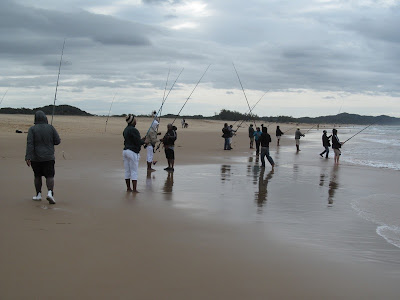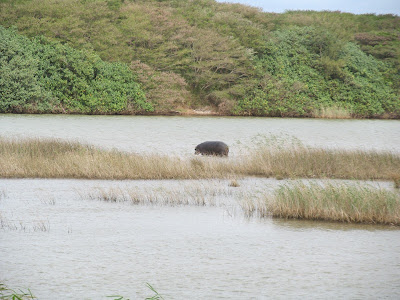Last week was a frustrating one. I’ve heard from volunteers
and PC staff alike that at about the one-year mark, you go through a slump. I
wasn’t necessarily anticipating this, but it seems to have happened. Perhaps it
is coincidence, or perhaps it is that I am having a harder time coping with
setbacks because of the timing. Either way, this week was not easy, and in many
ways, I feel like I’m back at square one.
Monday’s frustration was a result of a visit from the DOE District
Office. The week before, I attended a meeting with our district representative
where I was told that the Provincial Office is sponsoring a “pilot project”
where they monitor, evaluate, and possibly award schools that have established
and use a school library. This district representative told us that we would be
given “support” in the coming weeks to enhance and build on what we have
started. The first of these “supportive” visits came on Monday.
The three representatives from the district arrived just
past 11am, which would have been the perfect time for them to see the library
in action, as grade 6 has library class from 11am-12pm on Mondays. But instead,
class was canceled and the students never left their classroom because the
representatives said they wanted to see the library “undisturbed.” This really
should have been my first clue.
After a few minutes of the standard greetings, one of the
representatives asked to see our Accession Register while another started to
look through the books on the shelves. In a matter a seconds, we were told that
our numbering and labeling system did not match the official system and the
books would need to be “reprocessed.” When I pointed out that their official
labeling system would not allow for us to distinguish between duplicate copies
of a book (because all the copies would have the same spine label and we would
not know which one was missing should one go missing), one of the
representatives responded simply by stating that we should not be allowing
books to be checked-out since we did not have a full-time librarian to properly
run the library. When I asked how our school should go about applying for a
full-time librarian, if that was the case, the same representative responded by
saying “there are no postings available.” I laughed out loud. Just to make sure
I understood correctly, I said, “So the DOE expects schools to have functioning
libraries, BUT they can only be functioning if there is a full-time librarian,
BUT we cannot have a full-time librarian because the DOE has no posts
available.” The response, “That is correct.” Way to be supportive! Instead of
saying “great work” for figuring out how to overcome the obstacles of no
resources or help, they basically came to say “you’re doing it wrong.” They cared
only about appearances and nothing of the true work that was being done by the
teachers and learners. One of the men that came from what I was told was the
“resource center” looked through every book on every shelf without saying a
word. He never said what he was looking for or why this was such an important
task. None of the three visitors asked how the library was used. They never
asked how frequently learners came or what programs were established to promote
reading. Their concerns were with the book labels and recordkeeping. And in
that regard, we were told we needed to go back and “reprocess” things. Back at
square one.
So that’s how the week got started. The other teachers did
not take it as hard as I did. Possibly because they are so used to the way the
DOE functions, that they recognized this as par for the course. Or possibly
because none of them has put as much work into the library as I have. I don’t
really know. But neither I, or any other teacher at the school, has any
intention of starting this task any time soon, so it is hard to say how it will
work out in the end. But it was not really the news I was expecting to hear.
Friday was when I got my next “start over” notice.
The first two weeks of the term, I was teaching fractions in
grade 5. It was new material as far as I could tell, and it was not going
great, but they were progressing steadily. I didn’t want to immediately give a
test on only fractions, so I decided to do a brief review of all the whole
number concepts that we had studied in terms 1 and 2 and then give a formal
assessment that covered all that material. As an added bonus, it also happens
to be what the curriculum says. I expected them to be rusty and need reminding,
but nothing could have prepared me for how little they seemed to remember. And
then it dawned on me – we had a THREE-WEEK vacation between terms 2 and 3. I
think a three-week school holiday would spell disaster in my American
classroom. Here in a rural school, it is nothing short of catastrophic. It’s as
if terms 1 and 2 never even happened. It really felt like starting a new school
year with these concepts. Virtually nothing seemed to have moved from their
short-term to long-term memory. There were two or three learners who had
relatively few problems, but I think that it was review for them when we did it
earlier in the year as well. The information had already transferred to their
long-term memory. For the rest, we needed to practice as much now as we did
several months back, and unfortunately, there was little time for that. I
reviewed the big things (addition with carrying, subtraction with borrowing,
and rounding) as much as I could and gave the test on Friday. Not exactly the
results I was hoping for. In the week we spent reviewing the whole number
concepts, many of them forgot the few new fraction concepts, and it became
apparent that most of the whole number concepts were still shaky for quite a
few. I finished marking the papers and then put them aside. Back at square one.
I’ll think of a plan for re-teaching and reviewing soon, but
the rest of the weekend I needed to spend time reminding myself that it is not
a waste of my time to be here. Gains are small and often unnoticeable or
immeasurable. But they are there. And I’ll get back to square two soon enough.



















